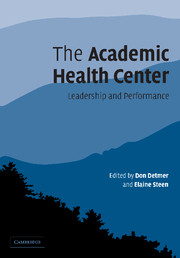Book contents
- Frontmatter
- Contents
- List of figures
- List of tables
- Foreword
- Acknowledgments
- List of contributors
- Introduction
- 1 Academic health centers: current status, future challenges
- 2 A health system for the twenty-first century
- 3 Stronger leadership in and by academic health centers
- 4 Pursuing organizational and cultural change
- 5 Managing and leveraging organizational knowledge
- 6 e-Health challenges and opportunities
- 7 Organizational challenges facing the European academic health center
- Index
- References
7 - Organizational challenges facing the European academic health center
Published online by Cambridge University Press: 12 November 2009
- Frontmatter
- Contents
- List of figures
- List of tables
- Foreword
- Acknowledgments
- List of contributors
- Introduction
- 1 Academic health centers: current status, future challenges
- 2 A health system for the twenty-first century
- 3 Stronger leadership in and by academic health centers
- 4 Pursuing organizational and cultural change
- 5 Managing and leveraging organizational knowledge
- 6 e-Health challenges and opportunities
- 7 Organizational challenges facing the European academic health center
- Index
- References
Summary
Introduction
In Britain, the interface between the health system and universities was once described as “the place where the present meets the future in health care” (Dainton, 1981). It is difficult to reconcile this grand portrayal with the picture that organizational partners face now, more than 20 years later. Research and clinical communities are more fragmented than in the past. New policy in both health and university sectors has unwittingly created incentives for partner organizations to point strategies in different directions. Universities are more focused on the future – with only a minority of medical research directly concerned with clinical problems. And university hospitals are more concerned than ever with present service demands. The capacity to relate ideas and research with practice is said to have diminished within European health care settings.
This situation has serious implications. The strength of collaboration between the clinical and research domains determines to a large degree the capacity to transfer knowledge to practice, to focus research on critical clinical issues, to develop new services, and to prepare professionals for interdisciplinary and reflexive practice.
Local or central health authorities fund hospitals and manage their performance. Separate central ministries fund and manage the performance of universities. European AHCs, as the collaborations between faculties and university hospitals might be labeled, have been weakened by a gradual untangling of policy strands between education, service, and research.
- Type
- Chapter
- Information
- The Academic Health CenterLeadership and Performance, pp. 279 - 298Publisher: Cambridge University PressPrint publication year: 2005
References
- 1
- Cited by



